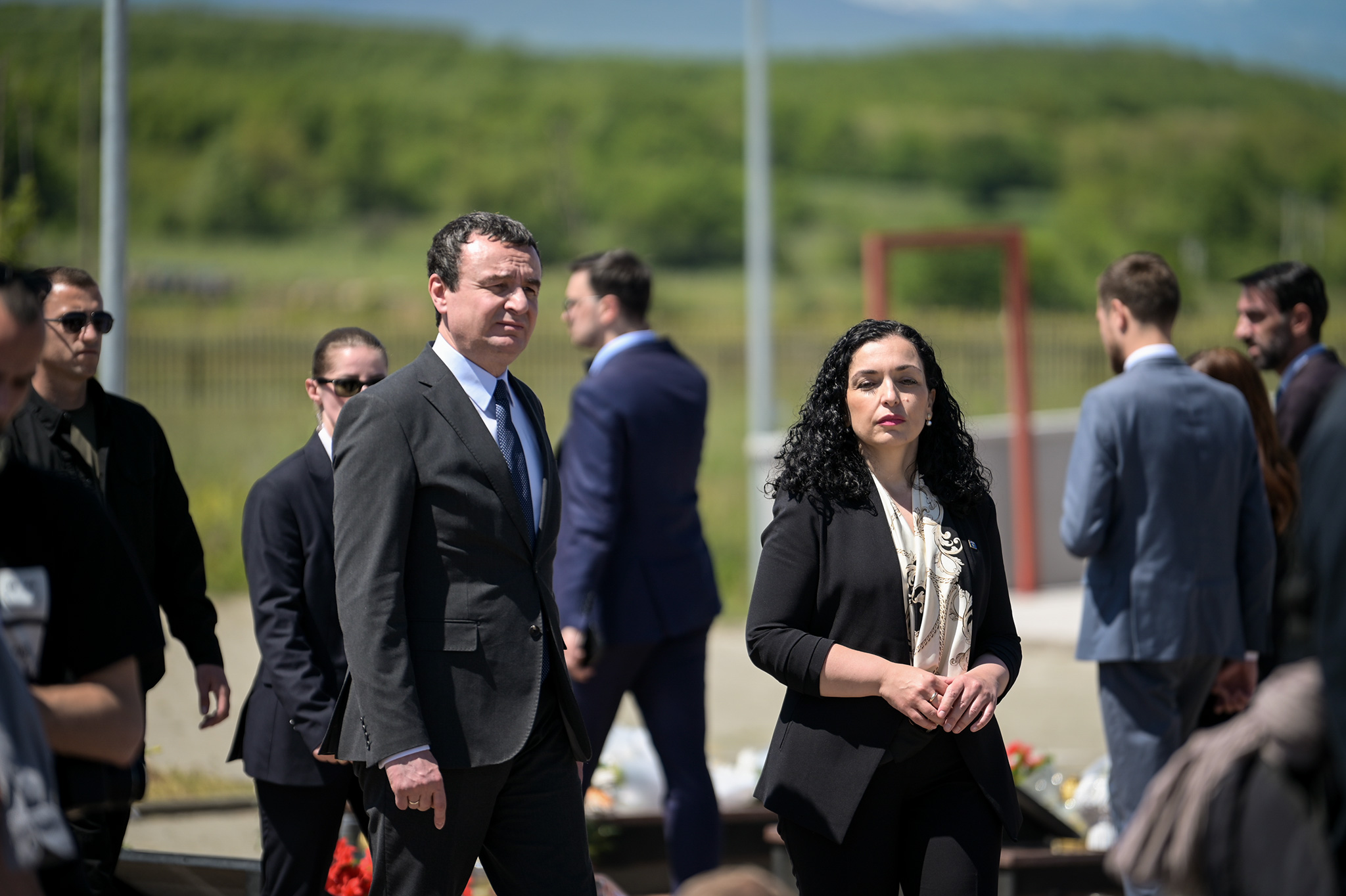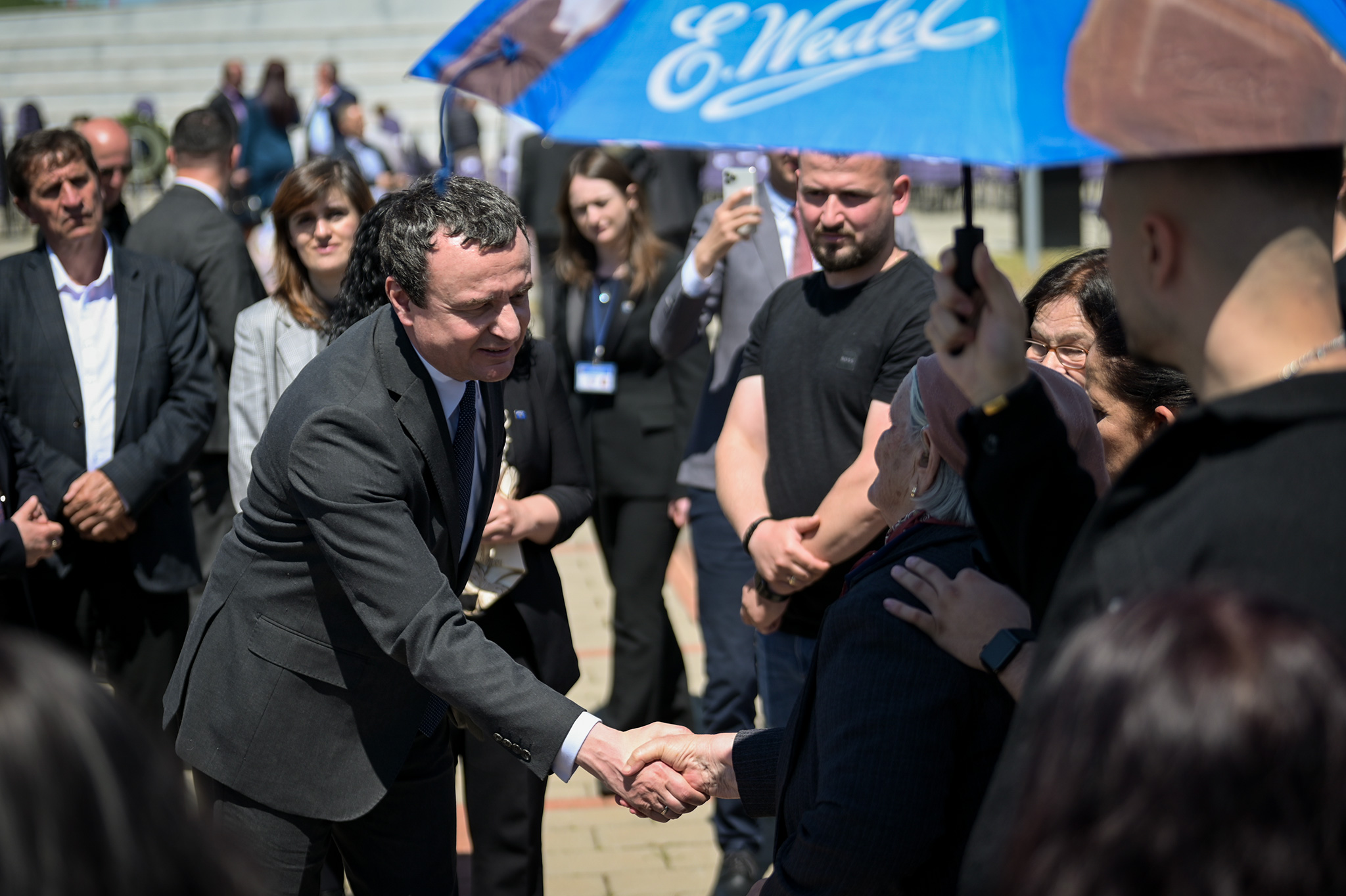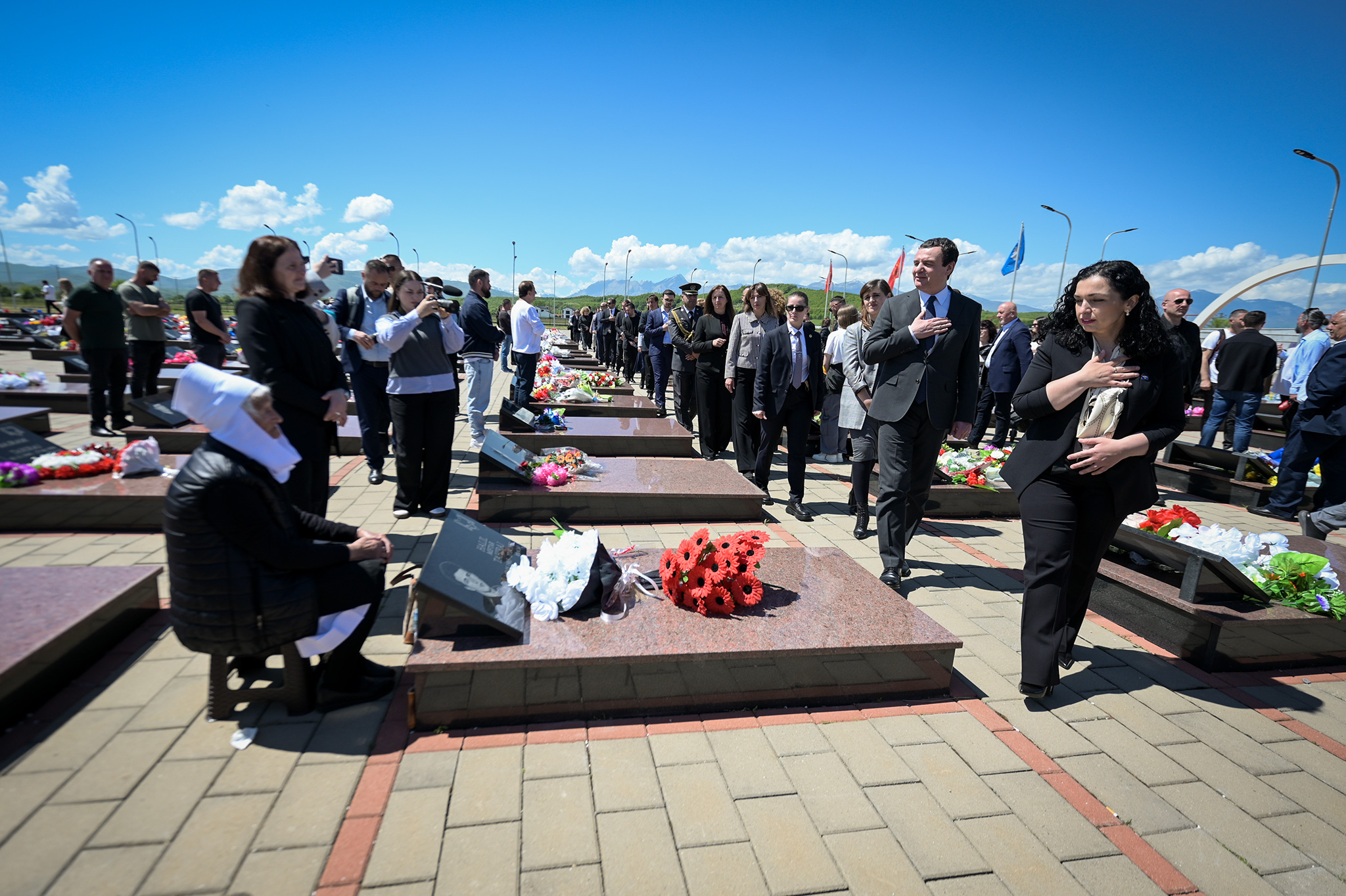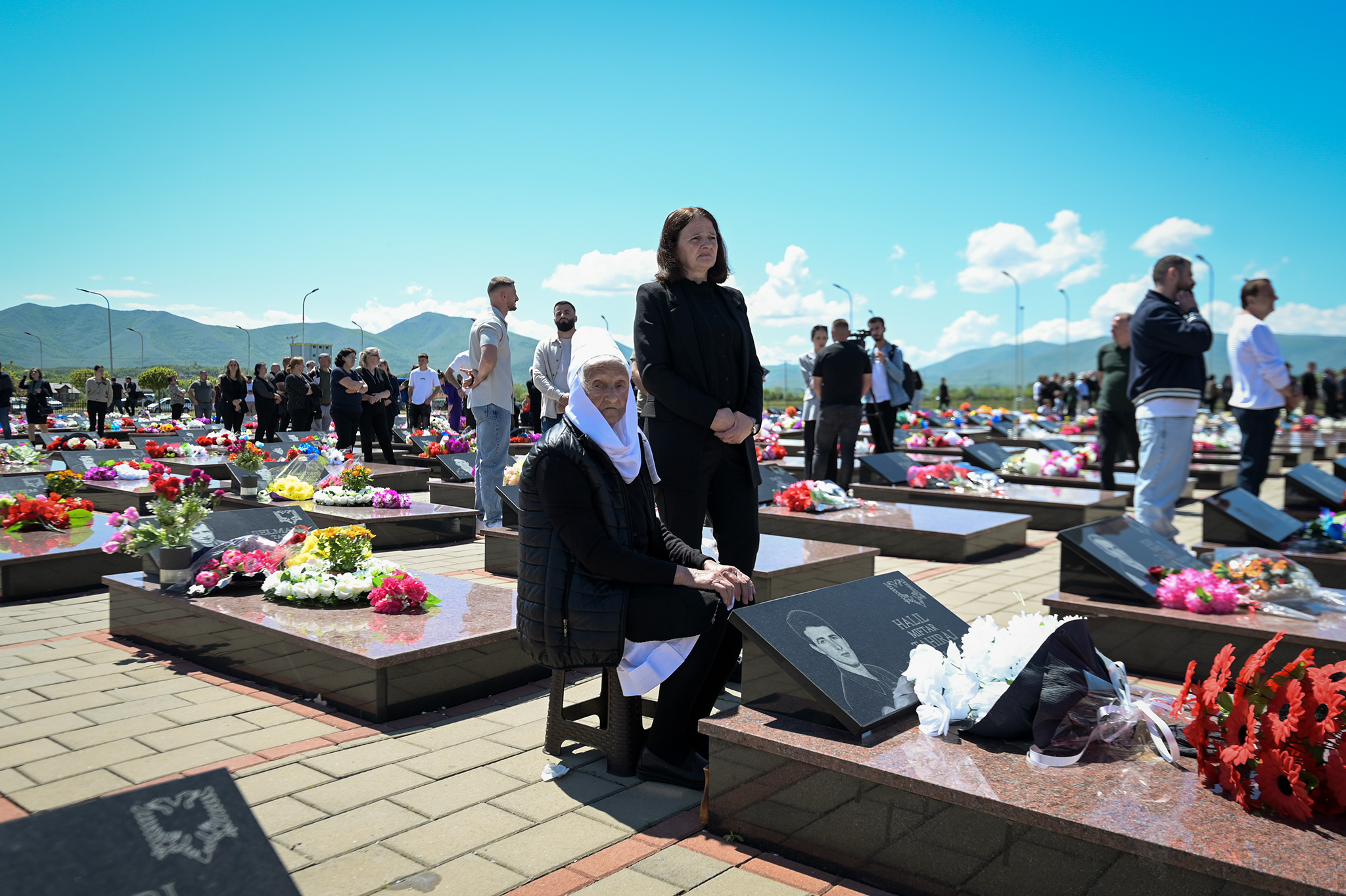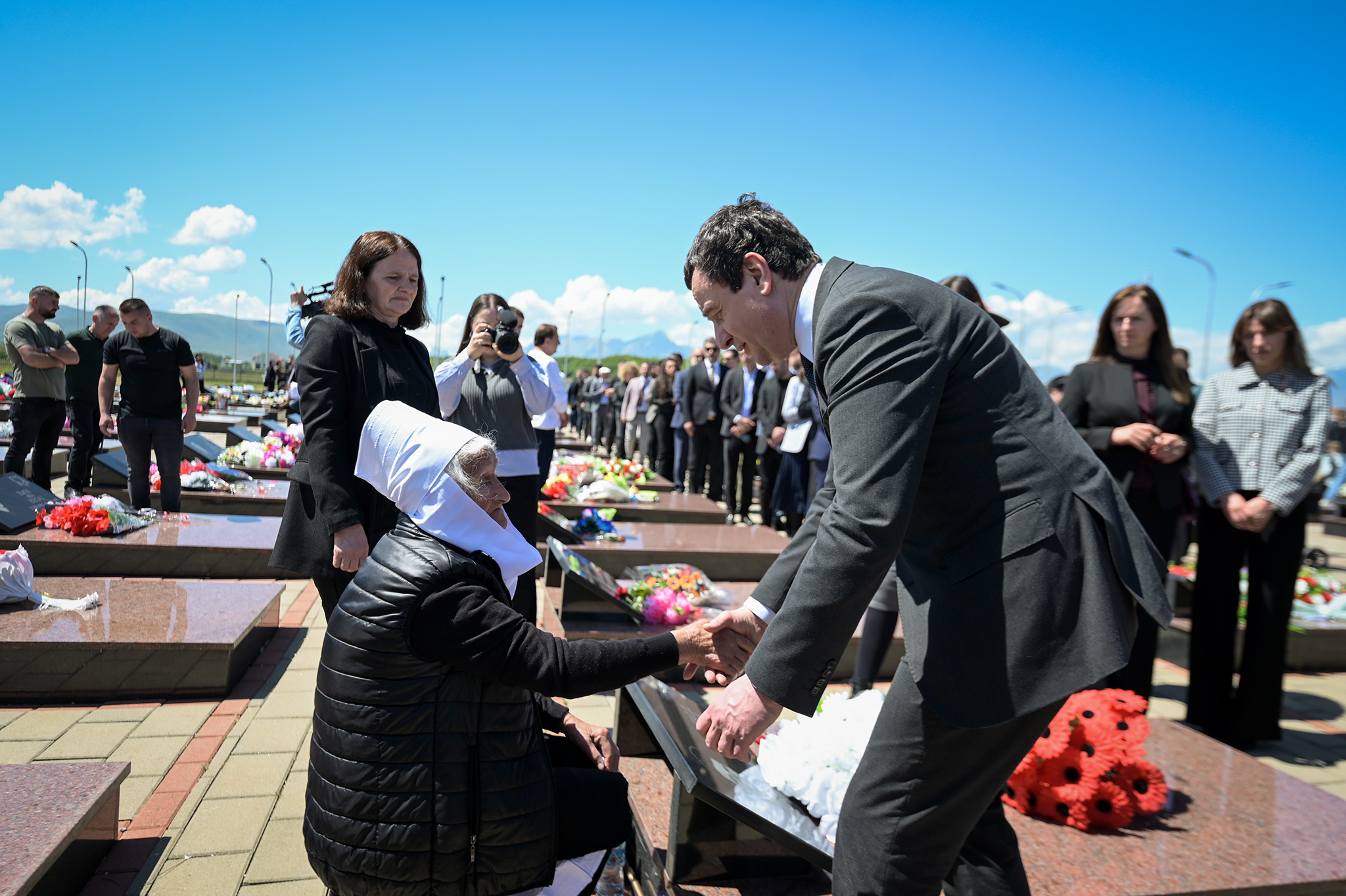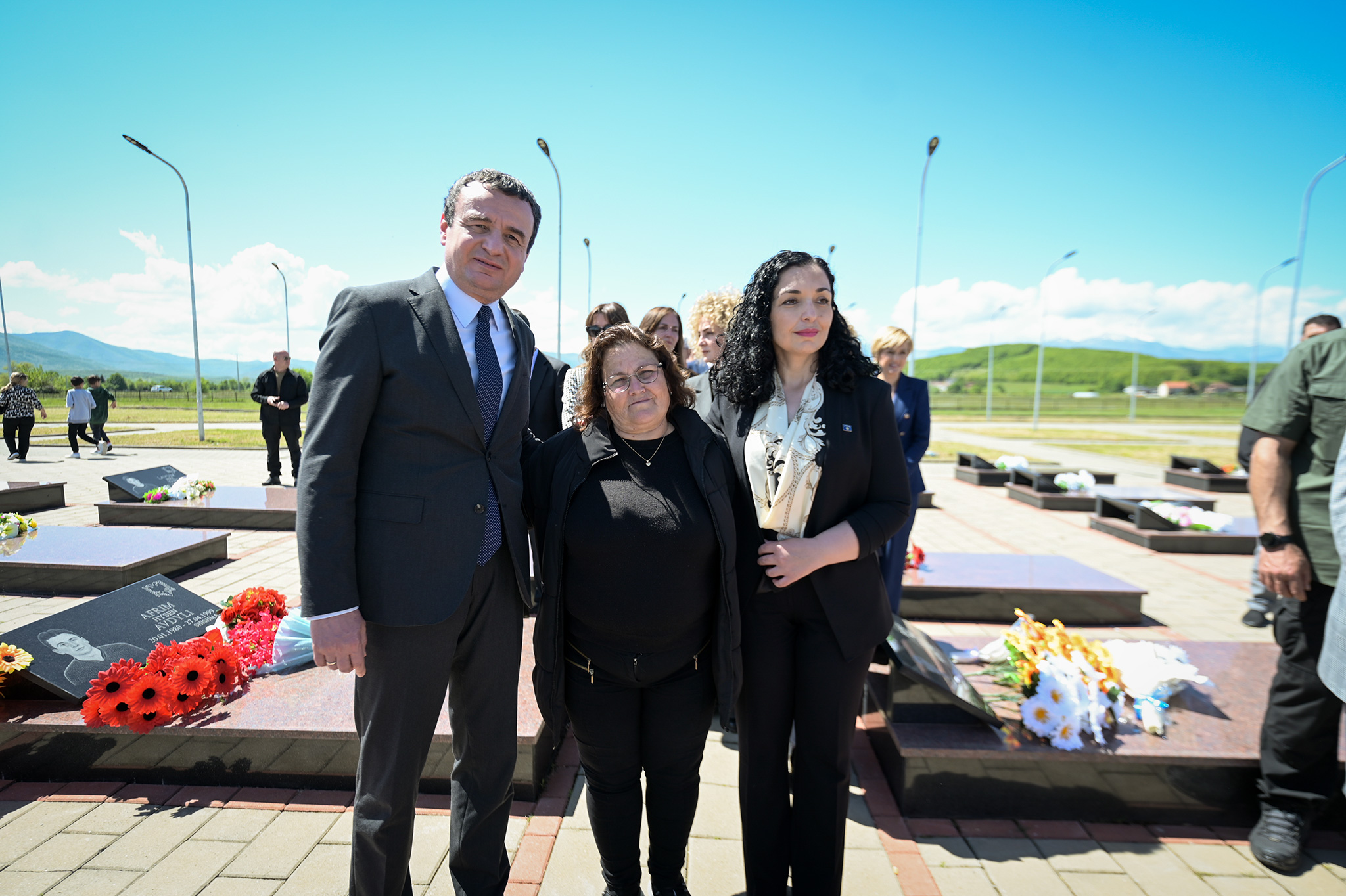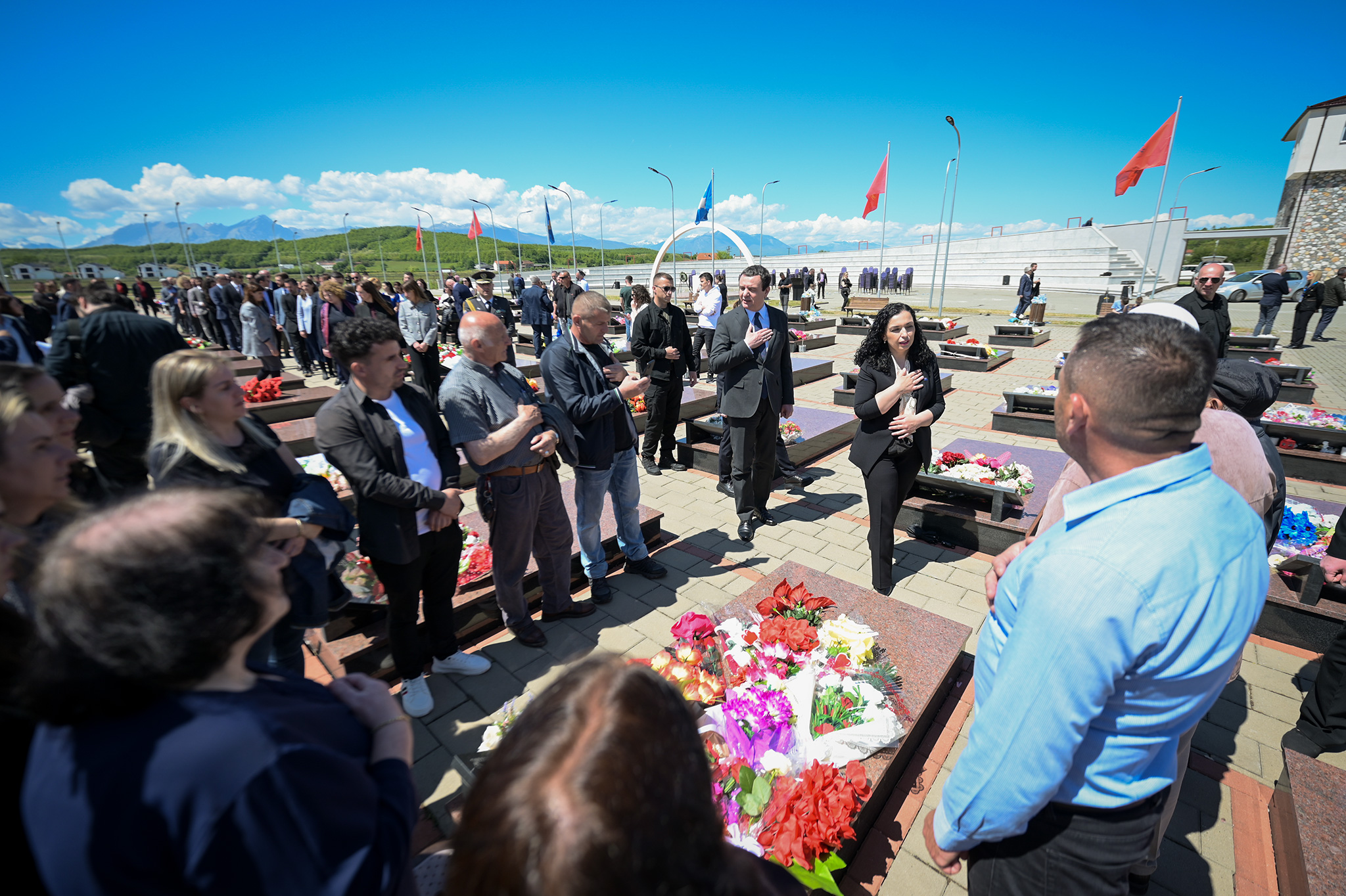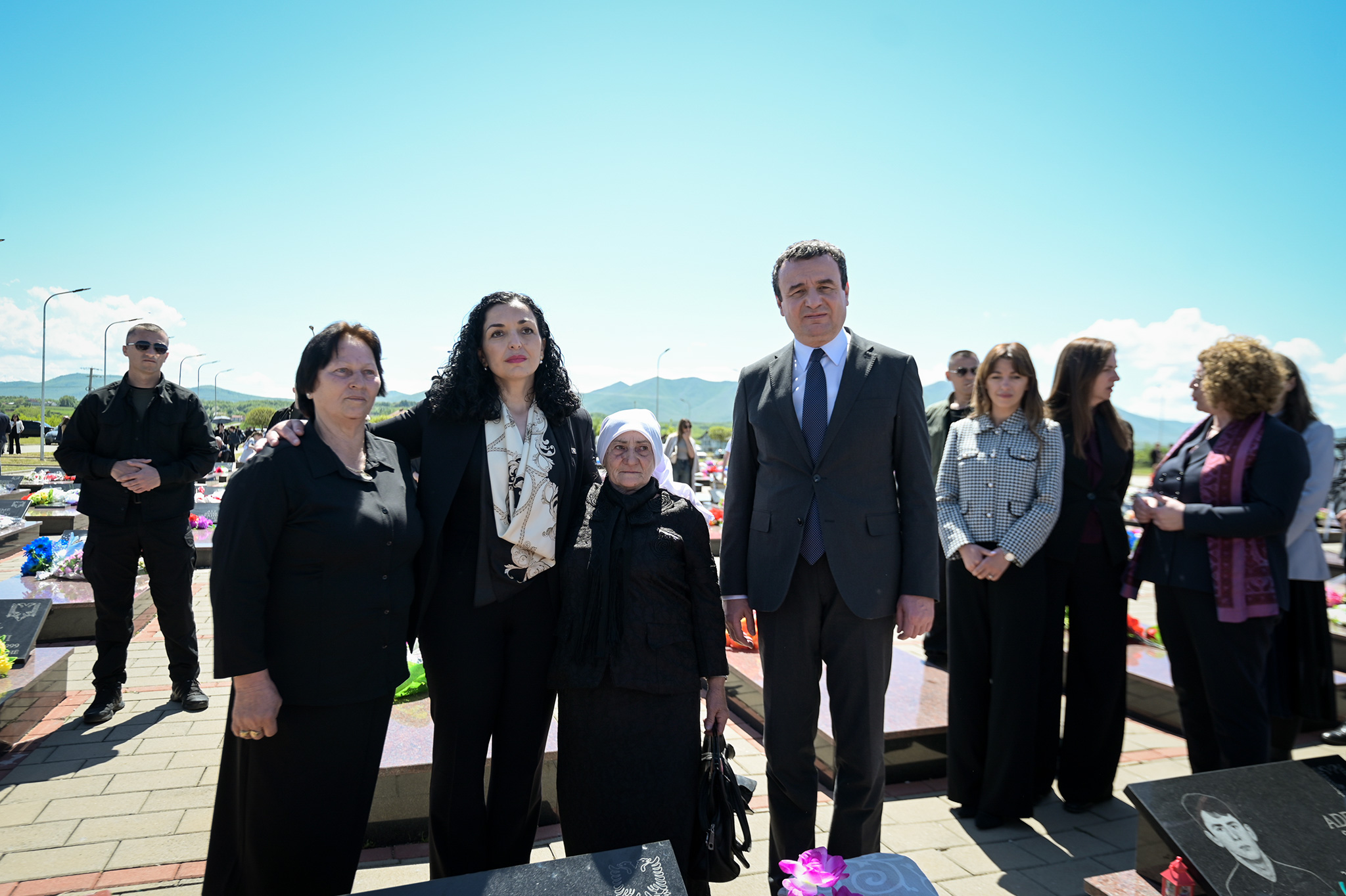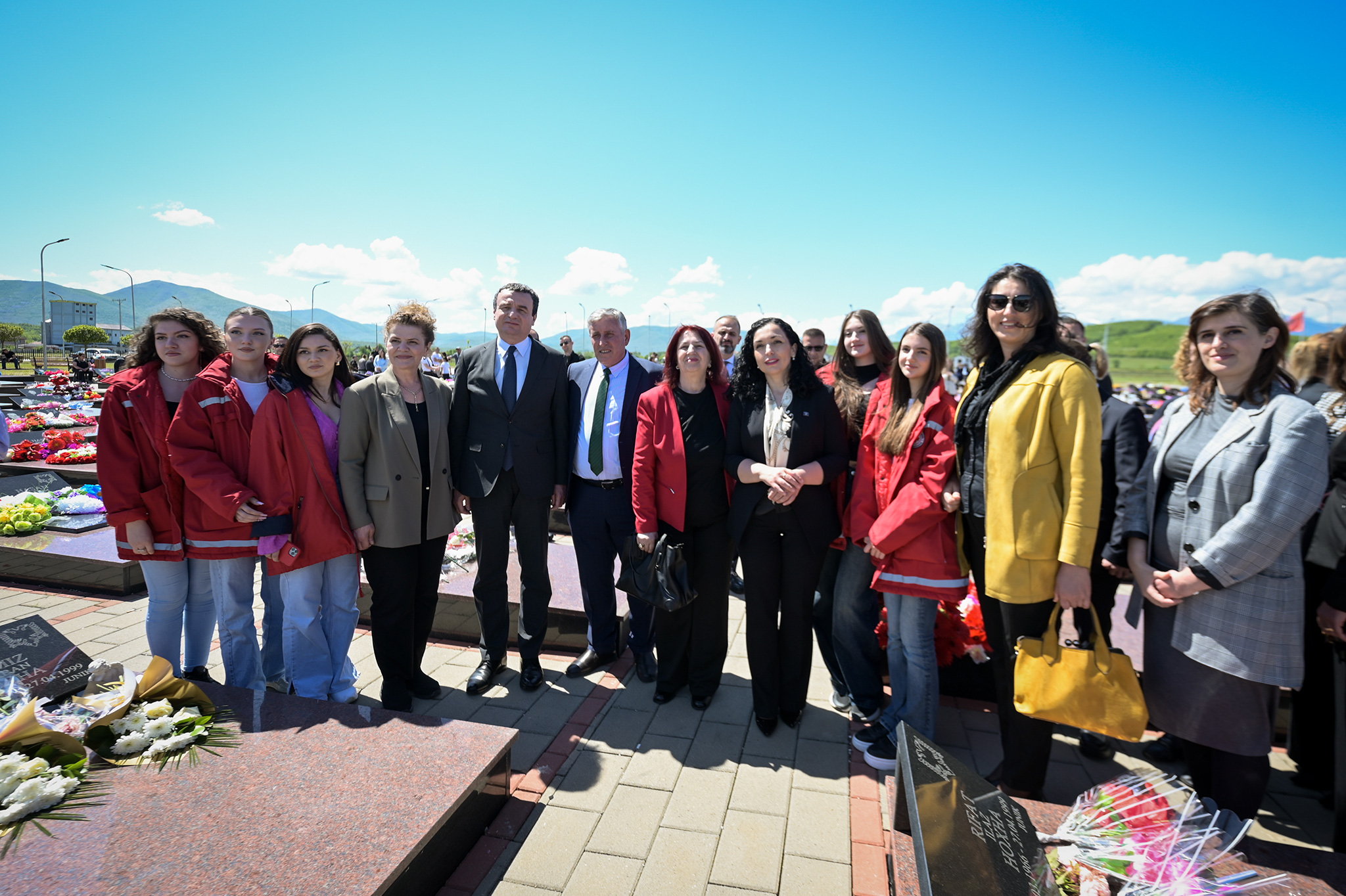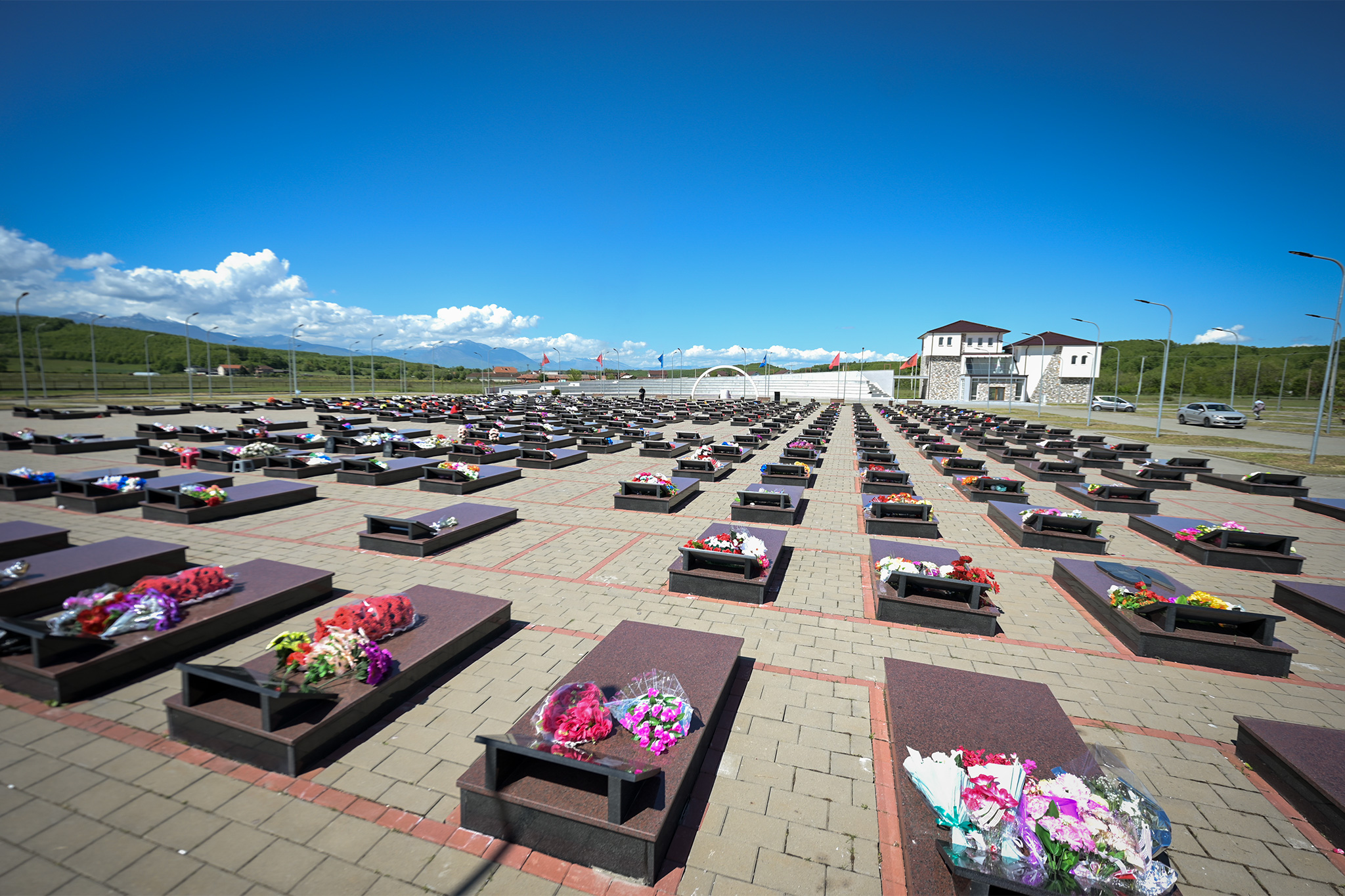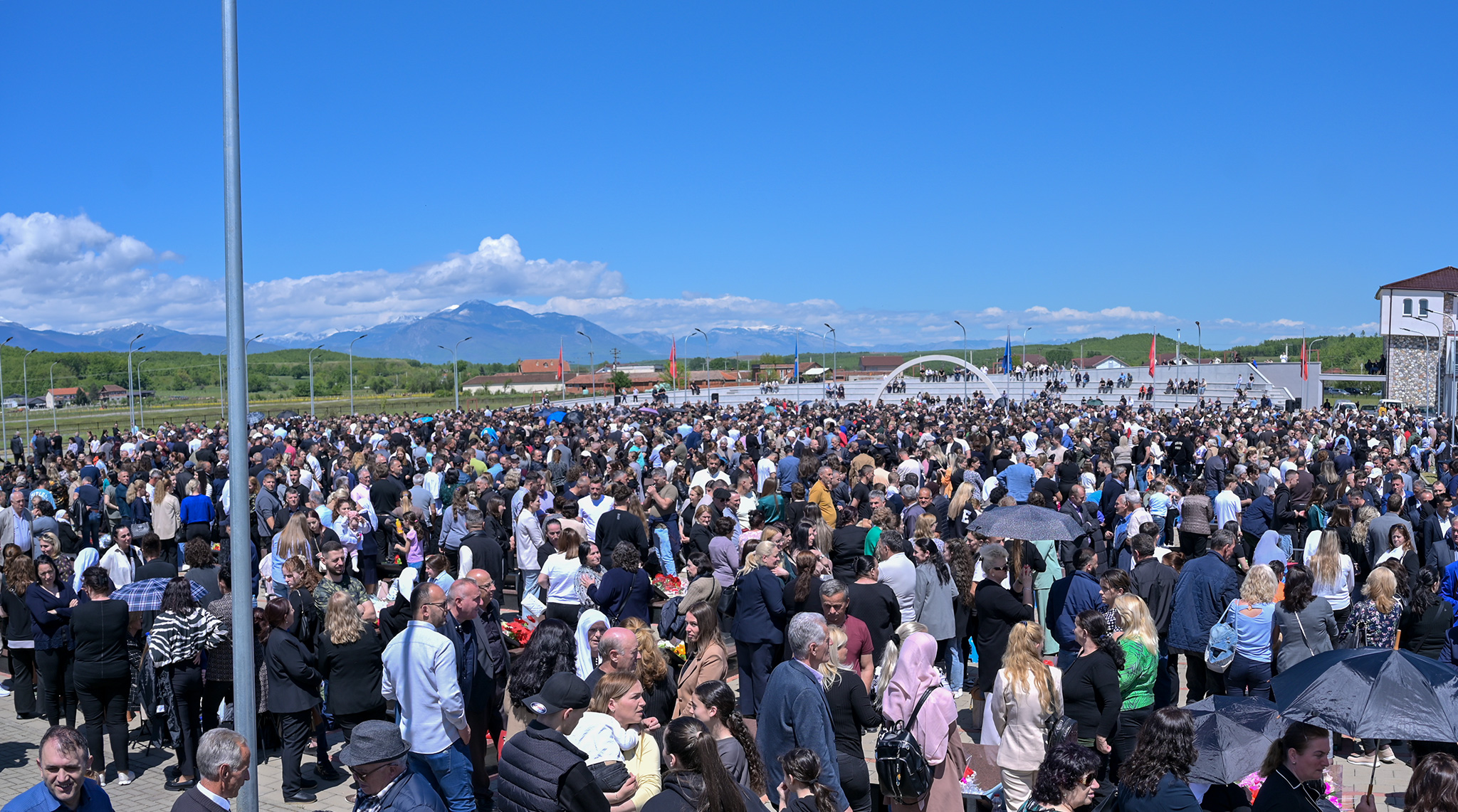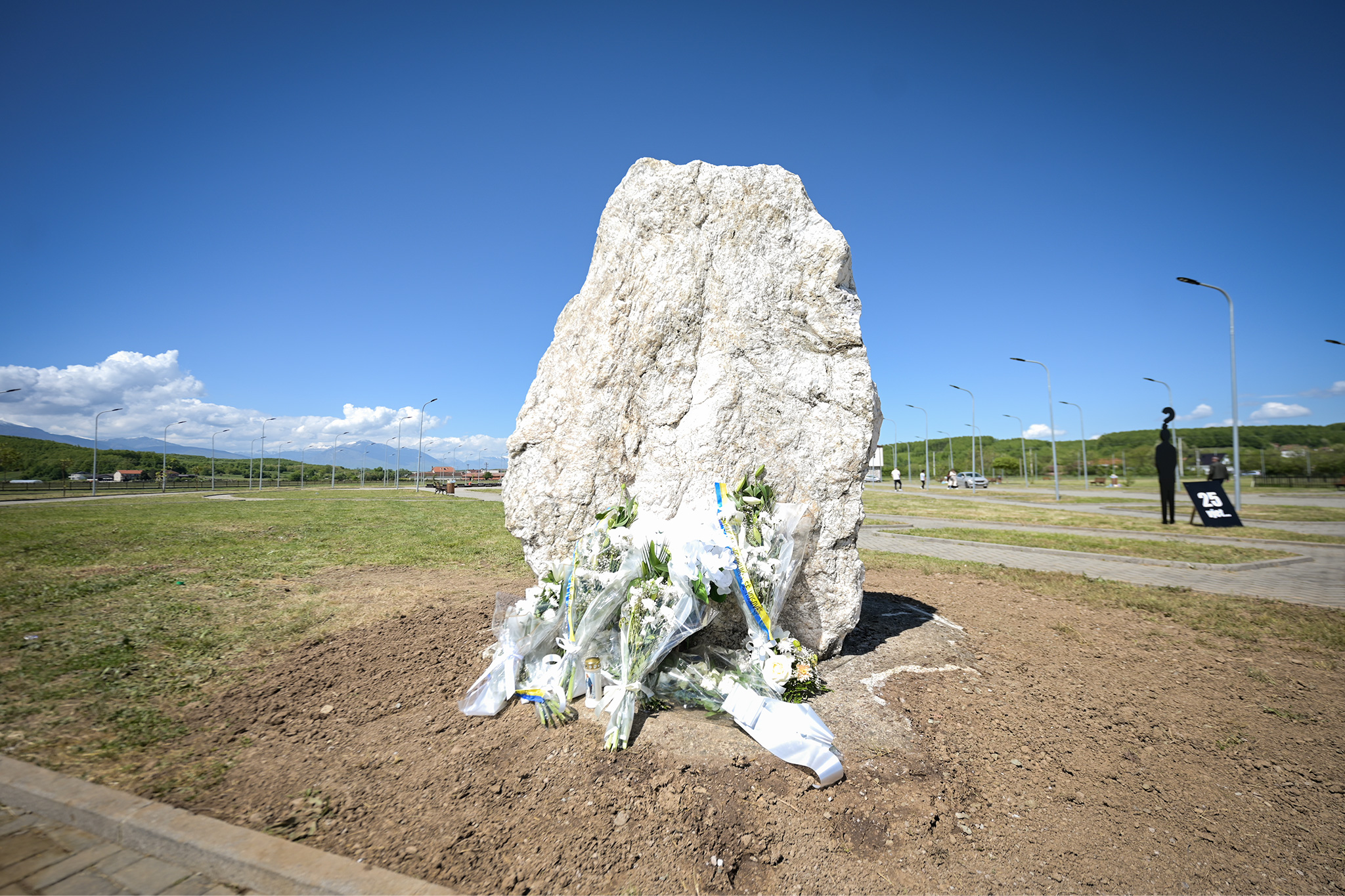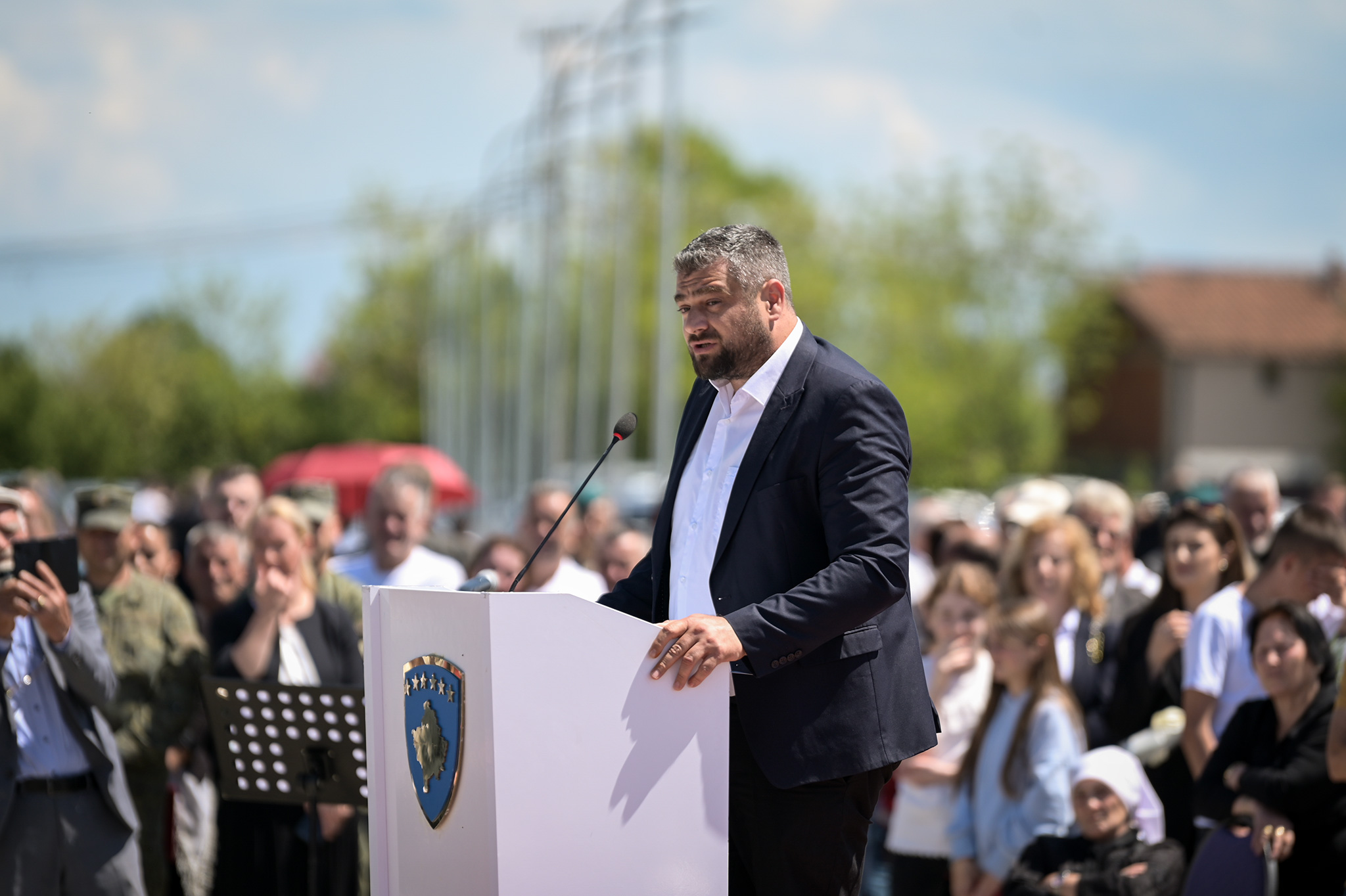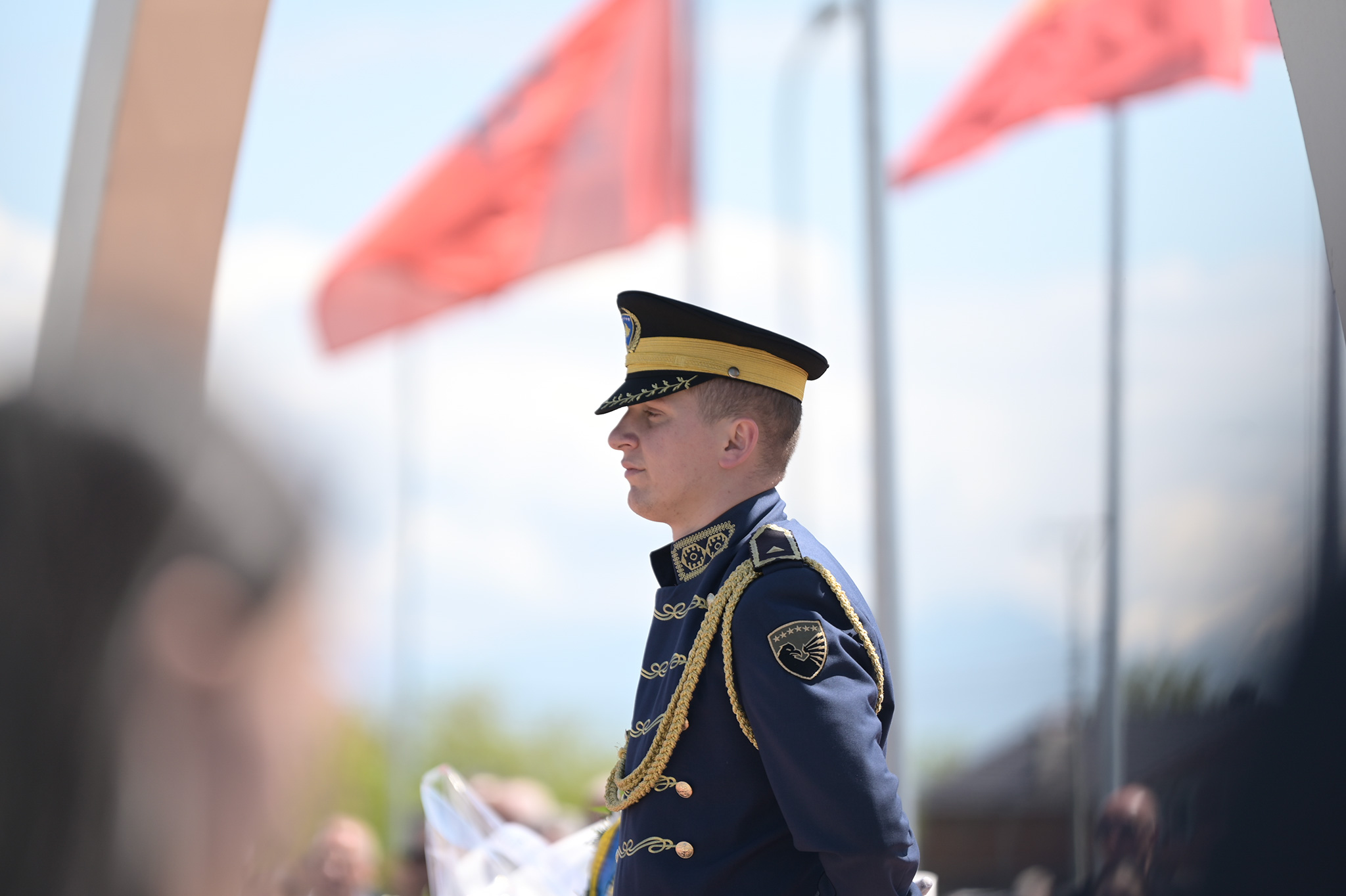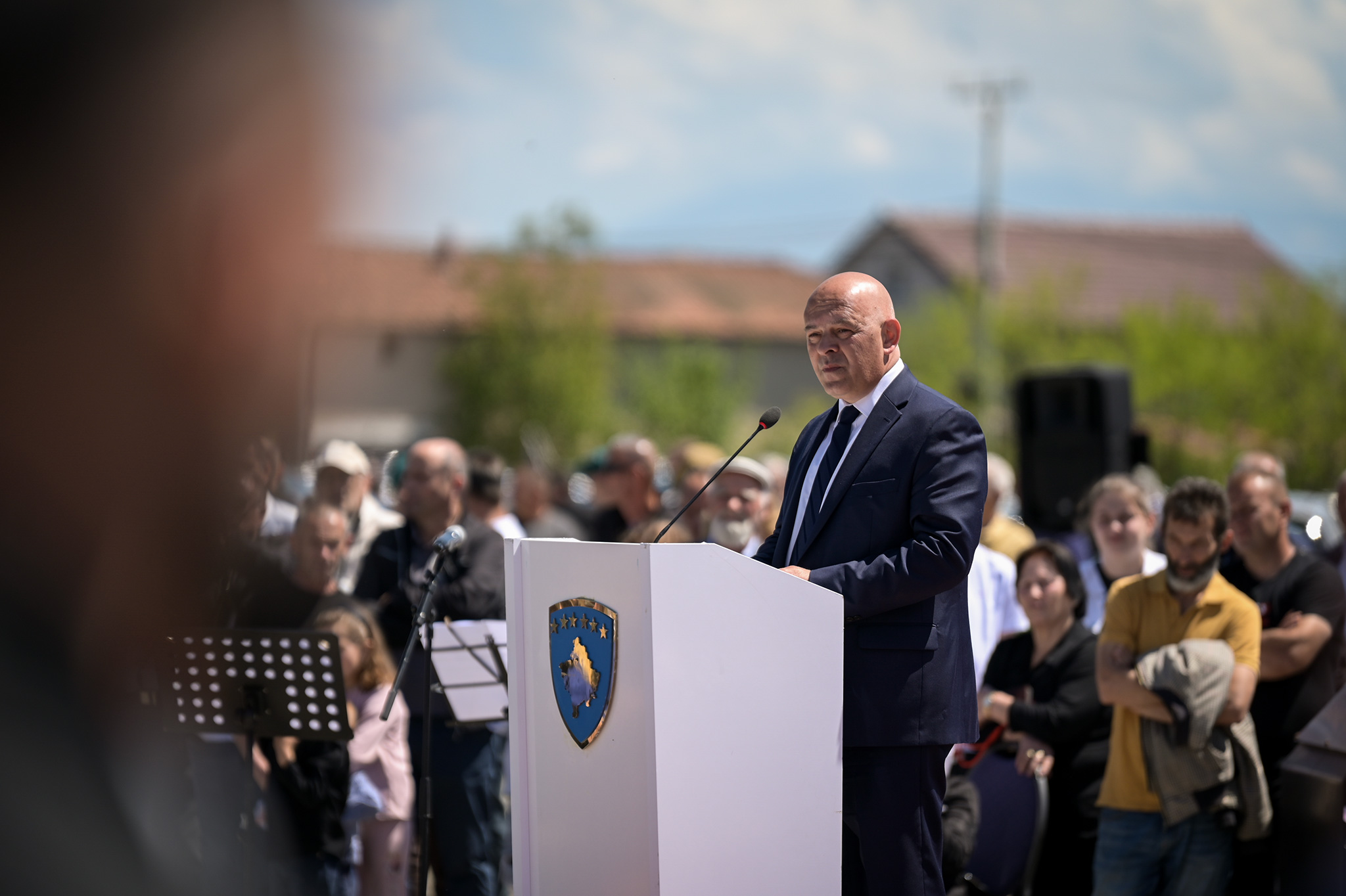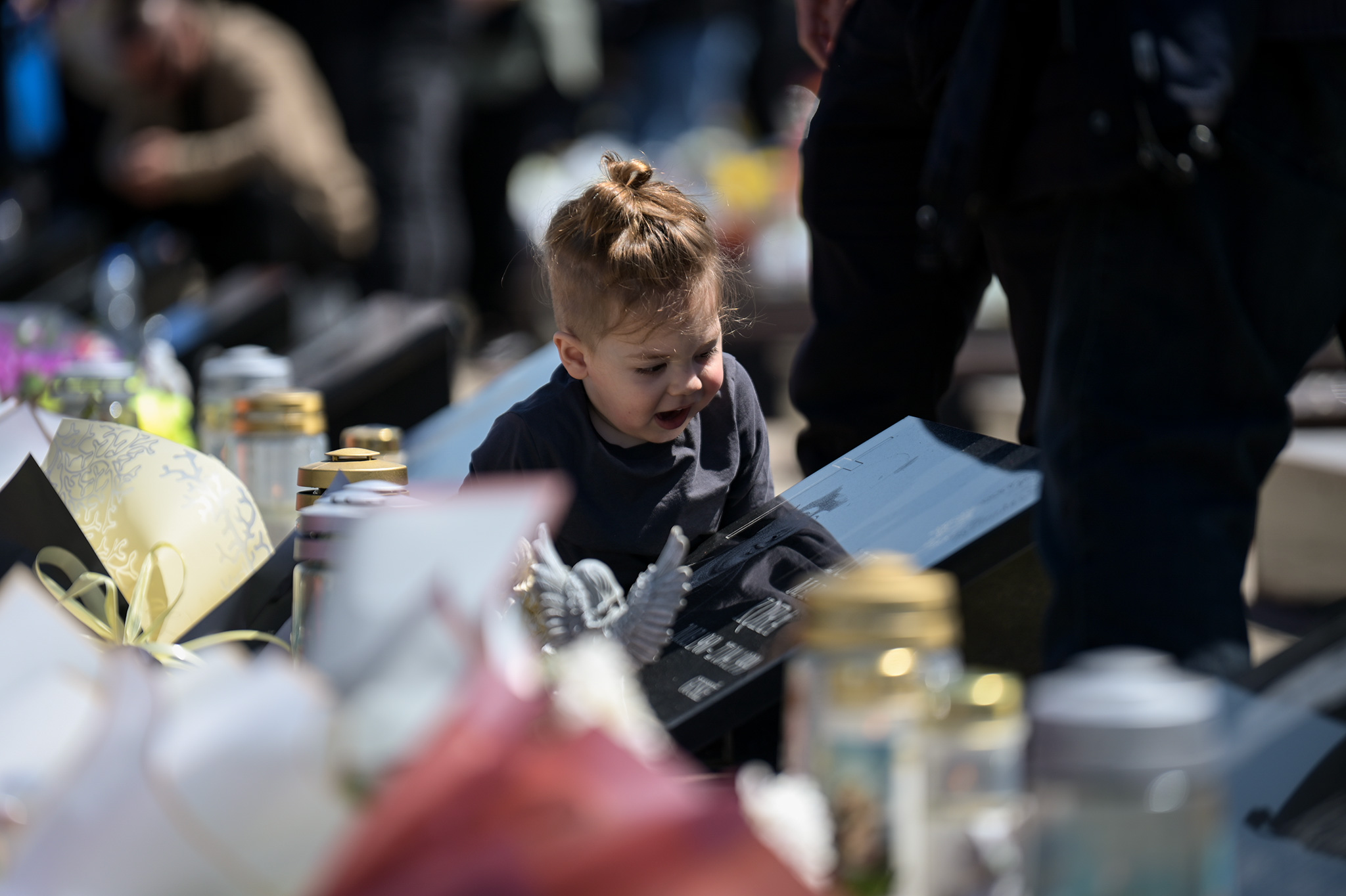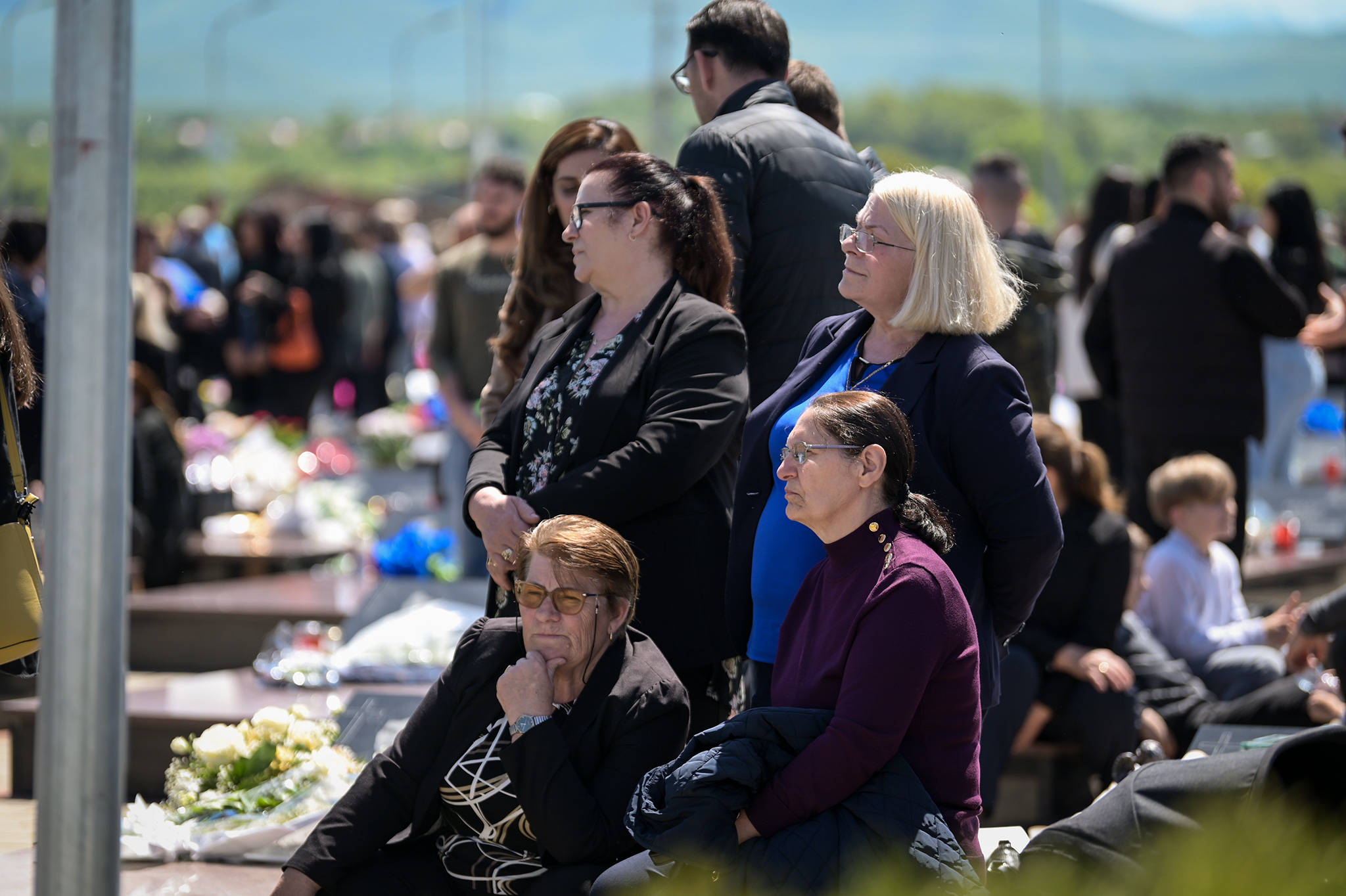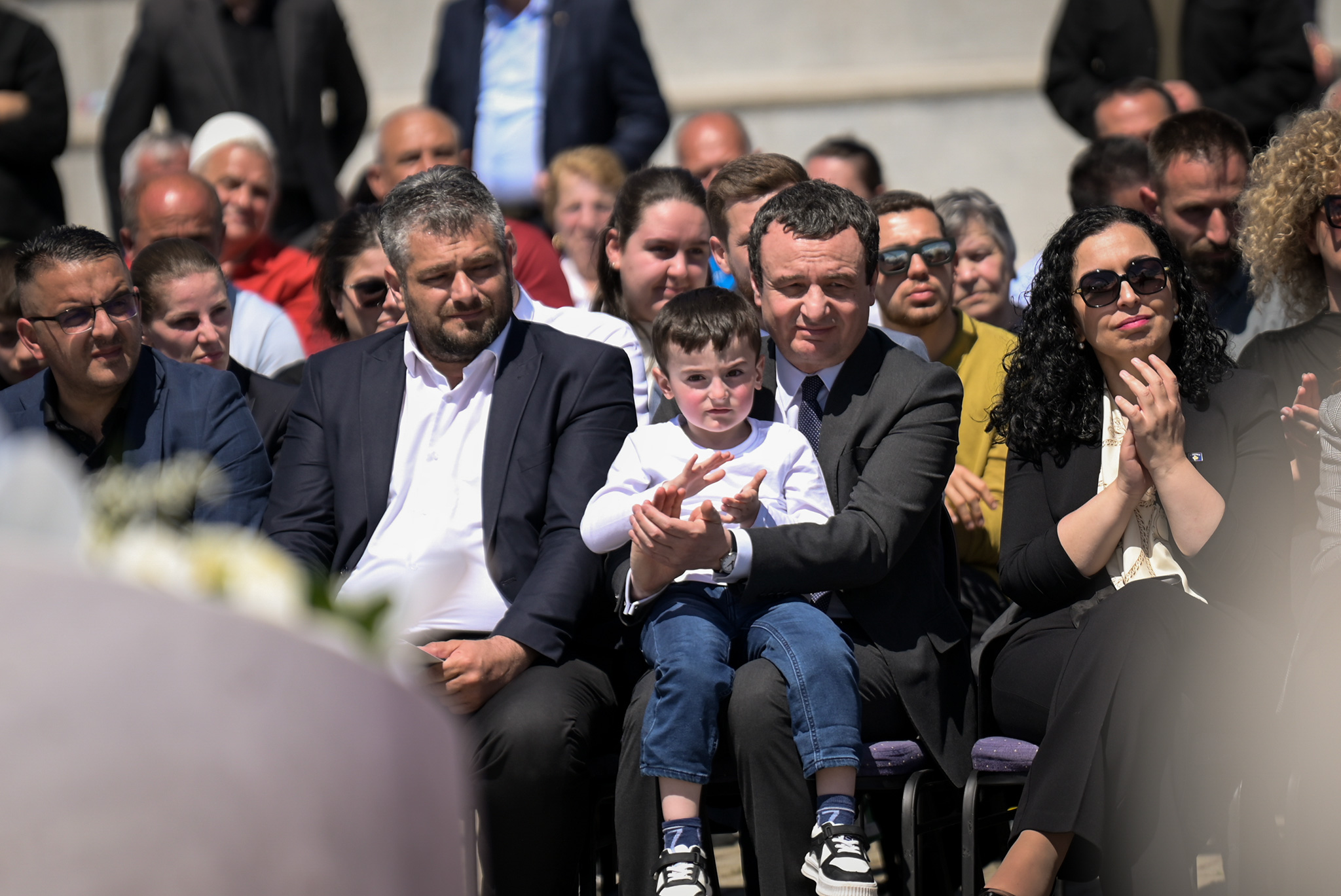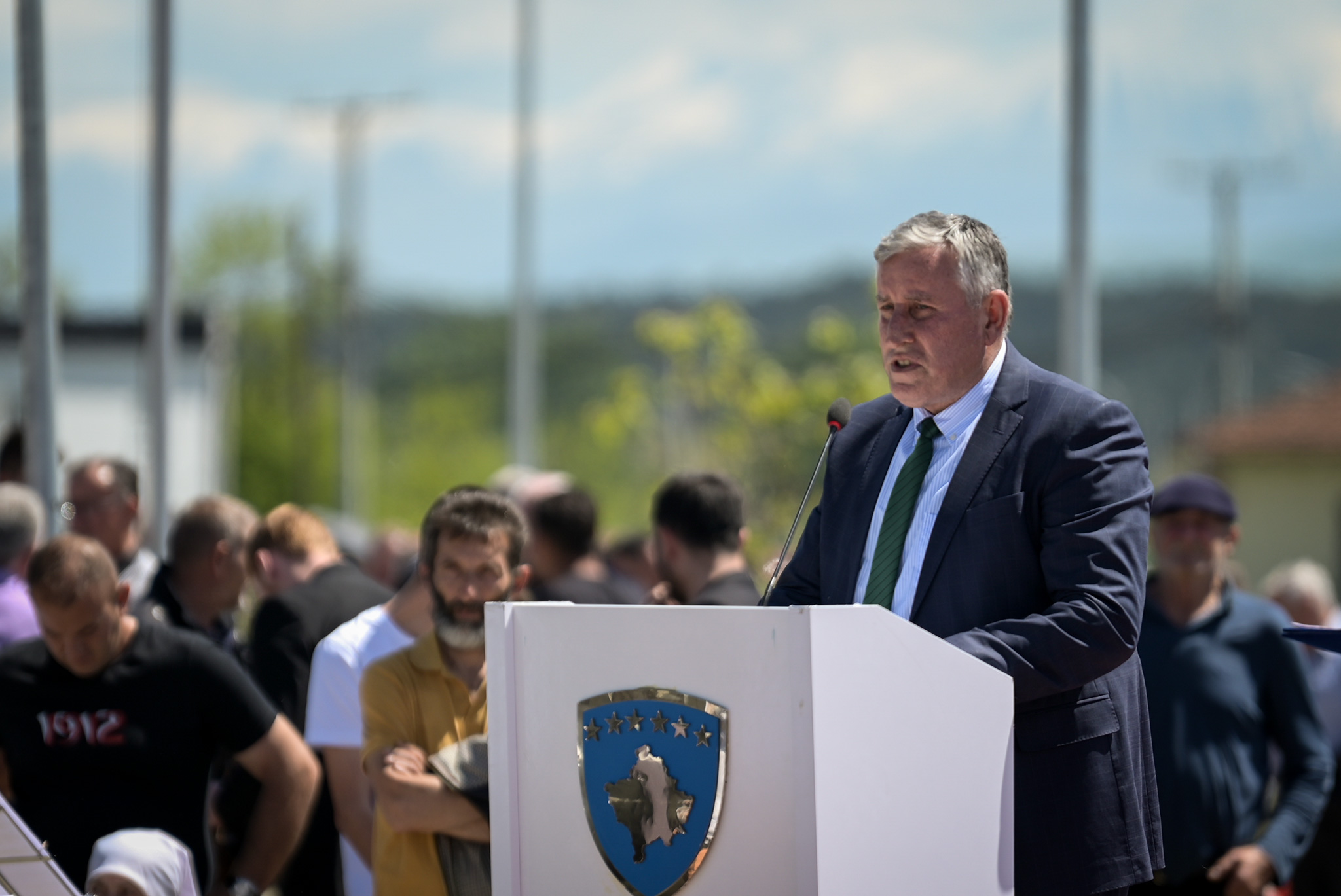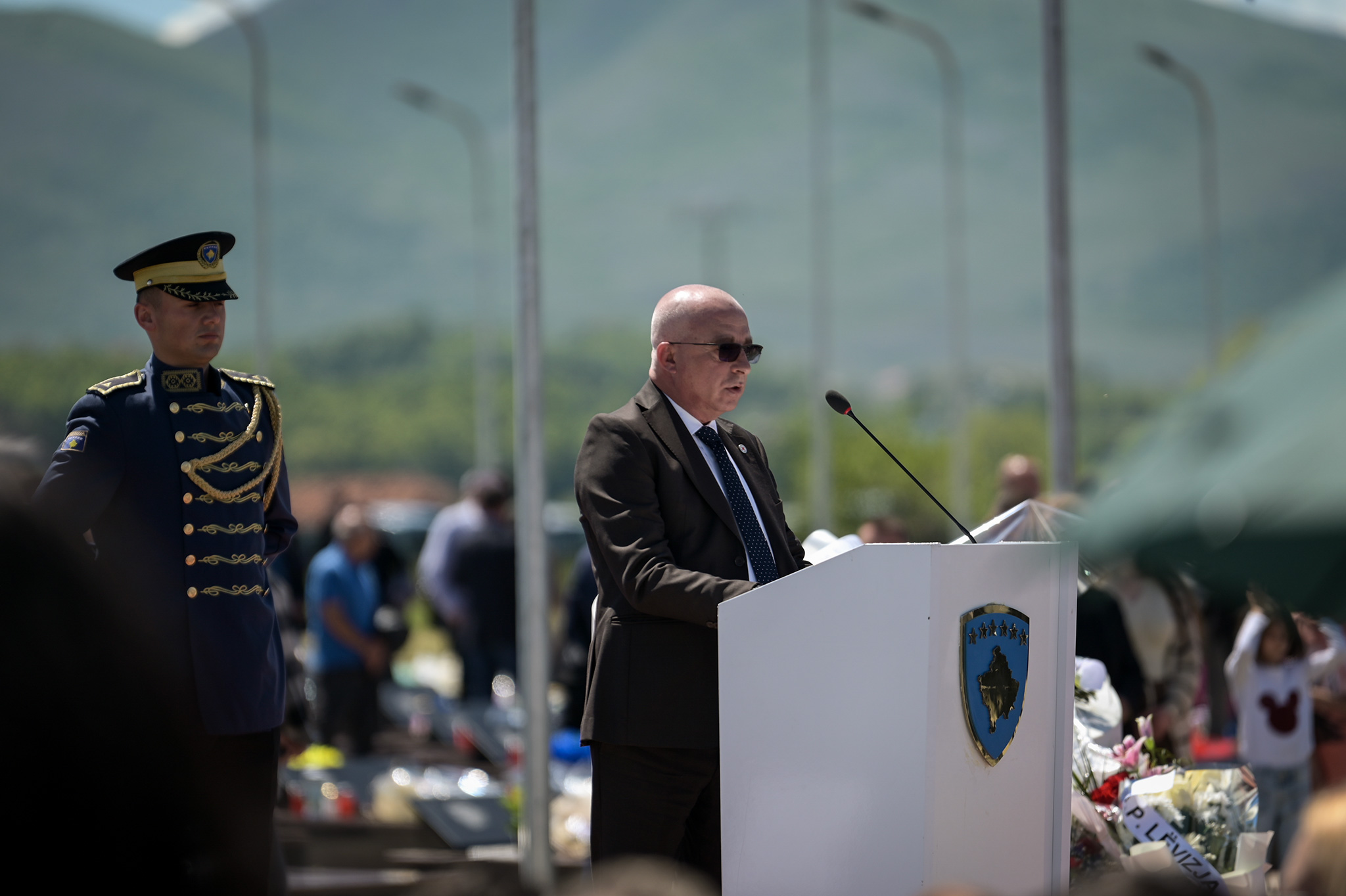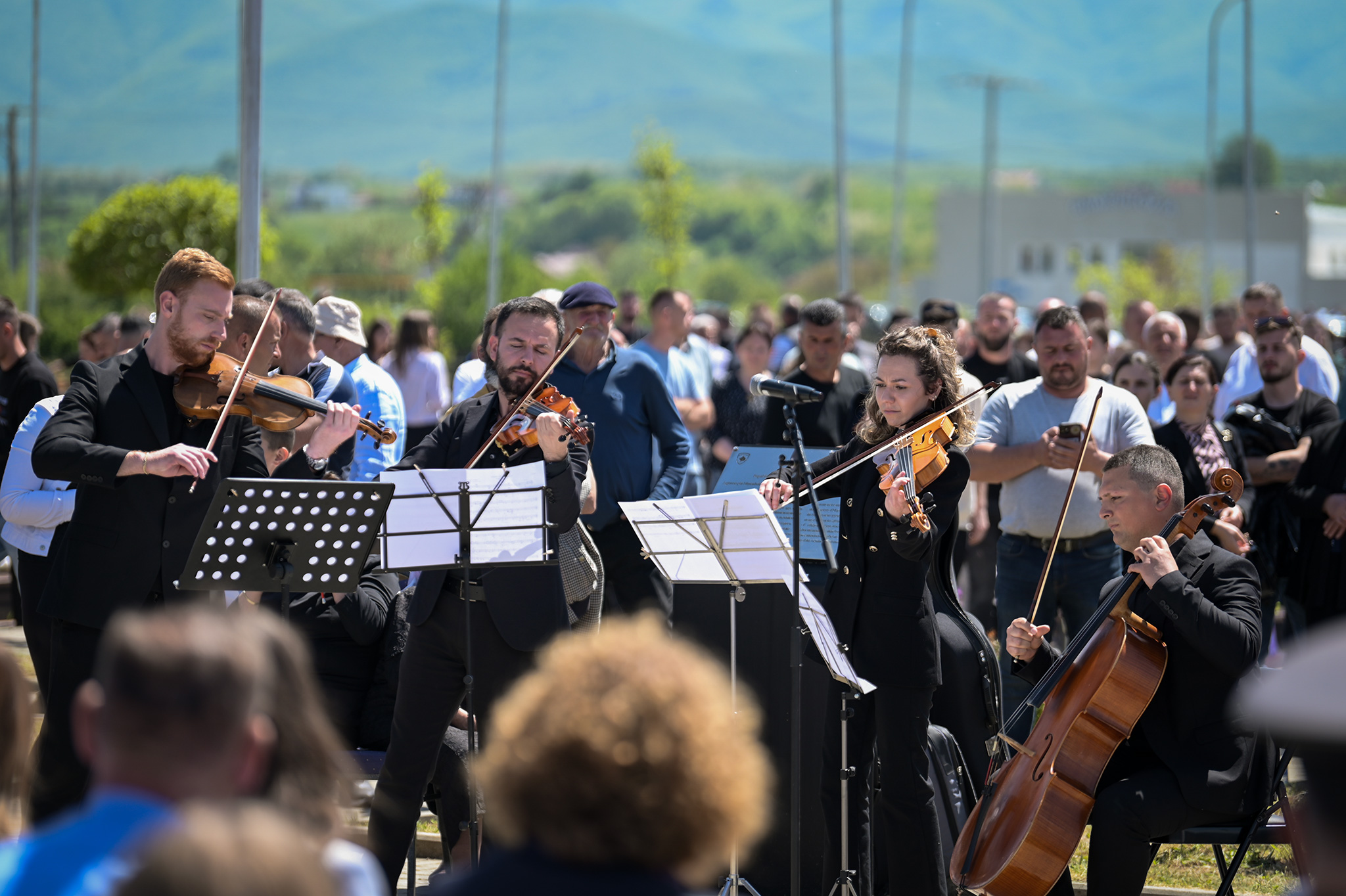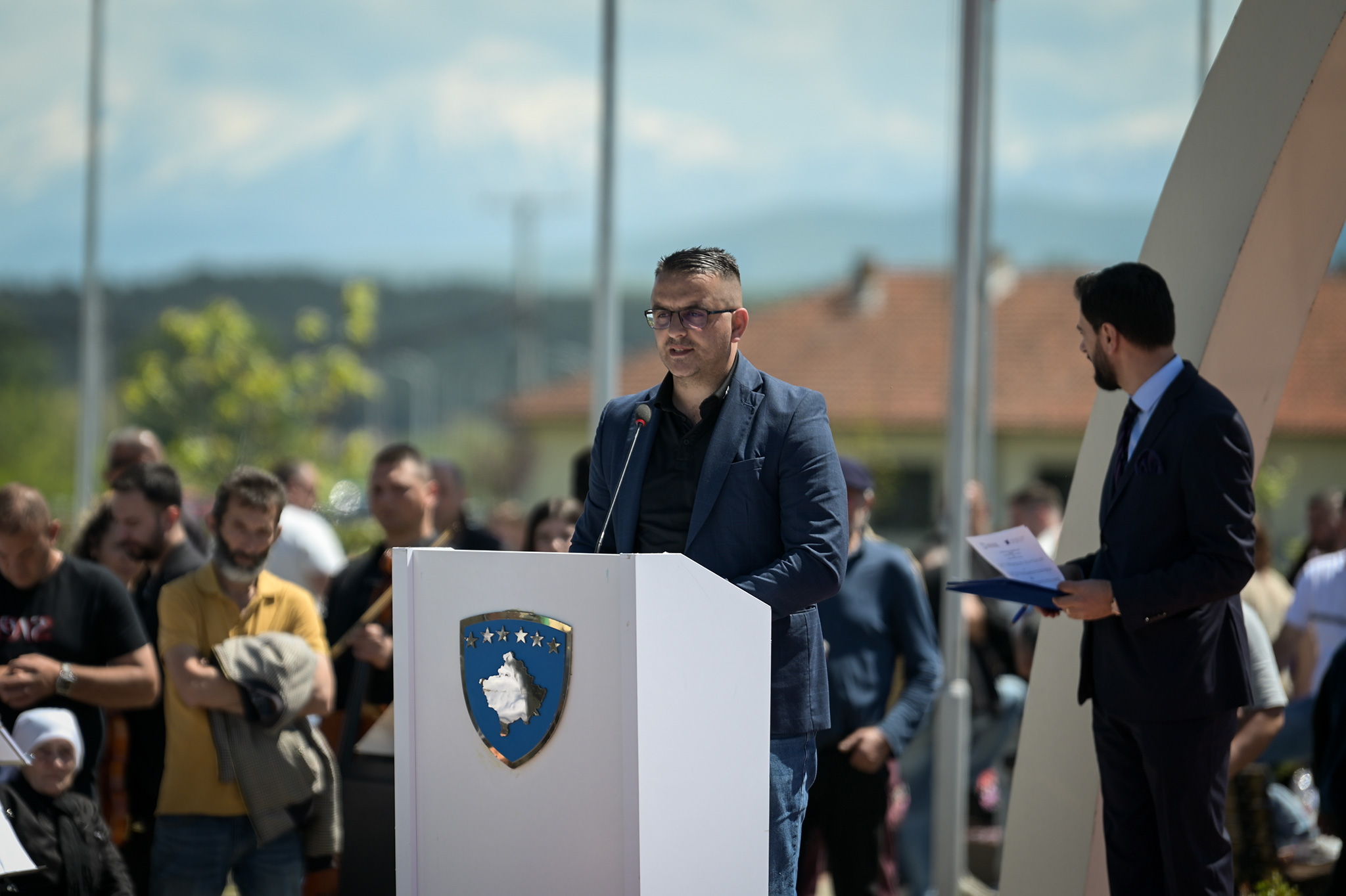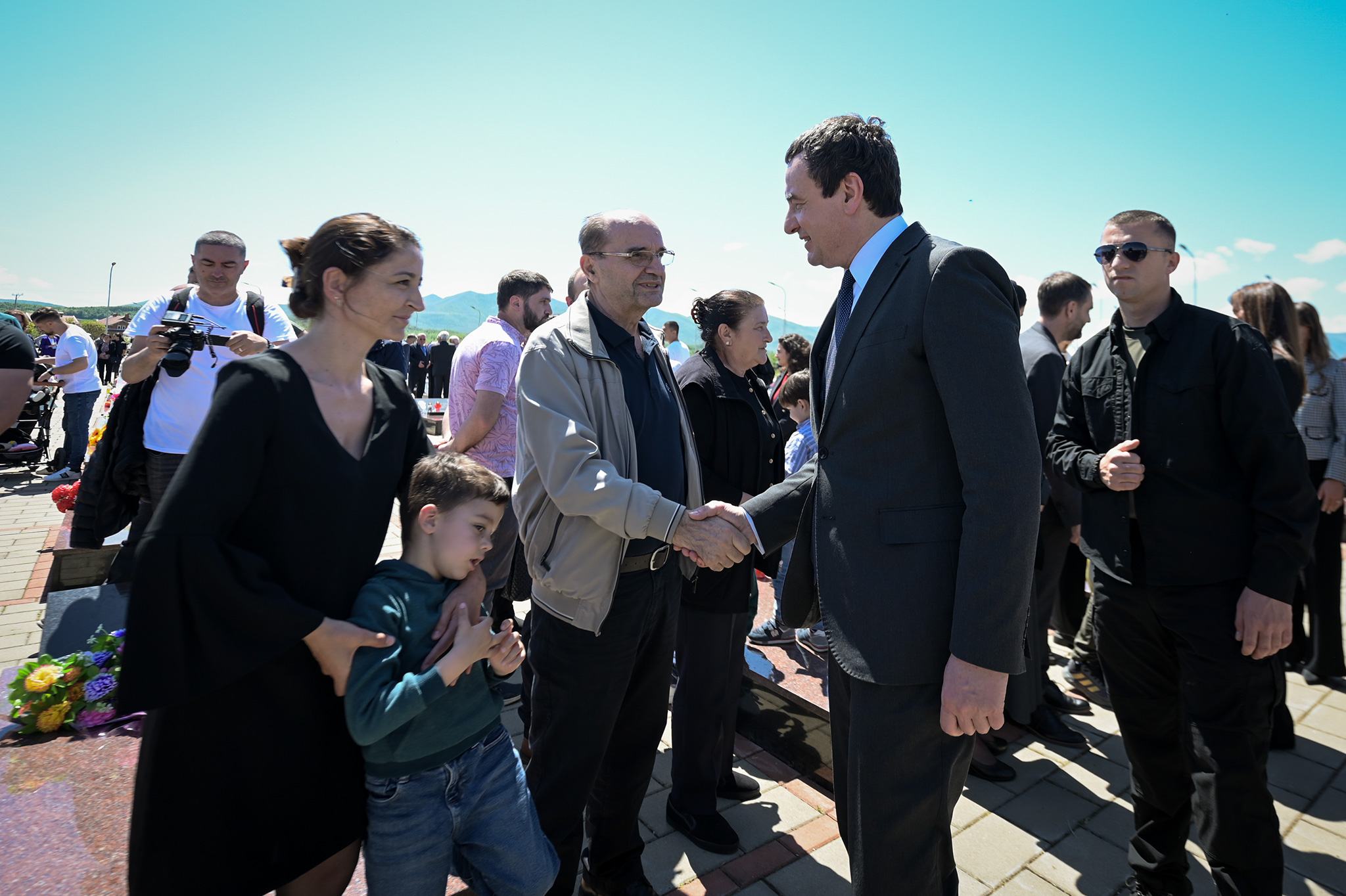Meja, Gjakova, 27 April, 2024
On the occasion of the Day of Violently Disappeared Persons, a commemorative gathering organized by the Office of the Prime Minister of the Republic of Kosovo, the Governmental Commission for Missing Persons, the Coordinating Council of the Association of Family Members of the Missing Persons of Kosovo and the “April 27, 1999 Meja” Association was held in Mejë.
The Prime Minister of the Republic of Kosovo, Albin Kurti, President Vjosa Osmani Sadriu and the Deputy Speaker of the Assembly, Saranda Bogujevci, placed bouquets of flowers in memory of the Easter Mother and paid their respects at the memorial erected in memory of those killed in the massacre in Meja.
Kosovo is celebrating the Day of Violently Disappeared Persons during the war, in memory of them, the massacre in Meja and all persons who disappeared violently during the war, Prime Minister Kurti said at the beginning of the speech.
In the history of the Kosovo war, the Prime Minister emphasized that the massacre committed in Meja and Korenica on April 27, 1999, is the biggest. “That day, 376 unarmed and innocent Albanian civilians were killed in these villages of Gjakova. Among them, 11 students and 20 teachers. Albanians were killed regardless of age, gender, origin, or religion. Here we have together the graves of Muslims and Catholics who were killed just because they were Albanians”, he said.
As he recalled the painful event of Meja, he said that today he would like to talk about another war, from Meja, where 25 years ago the biggest massacre was committed during the war in Kosovo, to speak about another war, an unfinished war: the war for the war of Kosovo.
“Although the armed and bloody war in Kosovo ended in June 1999, the war for Kosovo’s war has never ended and it continues today. On one side is the autocratic Serbia that tries to hide and deny the crimes committed by it in Kosovo, avoiding responsibility for them. And on the other side is democratic Kosovo, which with its society and state tells the truth about the war in Kosovo, from the places where the crimes were committed during the war like Meja and up to the highest international instances, like the Organization of Nations United” said the Prime Minister.
He spoke about the special struggle of the state of Serbia to appropriate, impose and dominate the narratives about the Kosovo war. Faced with these deceitful tricks of Serbia, the prime minister stressed that the Republic of Kosovo fights in its right against Serbia’s propaganda, in battles for the historical truth of the Kosovo war and for its justice.
At the end of his speech, the prime minister said that just as we won the war in 1999, with the relentless efforts of our people, with the glorious battles of the Kosovo Liberation Army, with the blood of the nation’s martyrs and with the support of our allies, we will also win the war for Kosovo’s war, with the historical truth, with justice for the crimes committed during the war, all of us together, the state and the people of Kosovo, with friends and allies as well as with our common values democratic and western.
The president of the country, Vjosa Osmani Sadriu, the vice president of the Kosovo Assembly, Saranda Bogujevci, the chairman of the Government Commission for missing persons, Andin Hoti, the chairman of the Municipality of Gjakova, Ardian Gjini, Agim Gashi from the Red Cross, Ahmet Graiqevci also spoke from the Coordinating Council of the Association of the Family Members of the Missing Persons of Kosovo and Sundim Krasniqi from the “April 27, 1999 Mejë” Association.
Today, in commemoration of this day, tributes were also paid near the memorial dedicated to persons who disappeared violently during the war in front of the Assembly of the Republic of Kosovo.
Prime Minister Kurti’s complete speech:
Your Excellency, Vjosa Osmani Sadriu, President of the Republic of Kosovo,
Dear Ms. Saranda Bogujevci, Deputy Speaker of the Assembly of the Republic of Kosovo,
Excellency ambassadors, ambassador of the Republic of Albania in Kosovo Mr. Petrit Malaj,
Dear members of the Assembly of the Republic,
Dear ministers, deputy ministers, and representatives and leaders of our state institutions,
Dear religious leader,
Dear Mr. Andin Hoti, Chairman of the Government Commission for Missing Persons,
Dear Mr. Ardian Gjini, Mayor of the Municipality of Gjakova,
The Honorable Mayor of North Mitrovica Municipality, Mr. Erden Atiq,
Dear Mr. Agim Gashi, Head of Mission of the International Red Cross in Kosovo,
Dear Mr. Ahmet Grajqevci from the Association of Family Members of Missing Persons,
Dear Mr. Sundim Krasniqi from the Association “27 April 1999 Mejë”,
Dear Mr. Atdhe Hetemi, director of the Institute for crimes committed during the war,
Dear representatives of central and municipal institutions,
Representatives of diplomatic missions and international organizations,
Dear attendees,
Ladies and gentlemen, sisters and brothers,
Dear mother and other family members,
At the entrance to the memorial, we honored the memory of the Easter Mother. We bowed before the monument of mother’s pain. Today and always we bow before your sacrifice, strength and endurance.
Dear attendees, this year marks 25 years since the spring of 1999, when the war in Kosovo reached its peak, before ending in June of that year, with the epilogue of the liberation of Kosovo from the invading Serbia. The spring of 1999 was the season of murders, massacres and crimes by the police and military forces of Serbia, ordered and carried out by the state of Serbia on the Albanians of Kosovo in the framework of their genocidal project for the extermination of our people. So for us, spring is the season of remembrance.
Today, Kosovo is marking the Day of persons forcibly disappeared during the war, in memory of them, the massacre in Meja and all persons forcibly disappeared during the war.
In the history of the Kosovo war, the massacre committed in Meja and Korenica on April 27, 1999, is the biggest. That day, 376 unarmed and innocent Albanian civilians were killed in these villages of Gjakova. Among them, 11 students and 20 teachers. Albanians were killed regardless of age, gender, origin, or religion. Here we have together the graves of Muslims and Catholics killed just because they were Albanians.
The first announcements and testimonies about the massacre of Meja were recorded the next day by the researchers of the international human rights organization Human Rights Watch. On the morning of April 28, 1999, they recorded the first accounts of this massacre from the refugees expelled from the villages of Gjakova, who, traumatized and without half of their family members, crossed the border point in Morina riding on tractors with trailers. Refugees told of groups of dead and piles of corpses in the village of Meje.
Six weeks later, on June 15, 1999, when Human Rights Watch researchers visited Meje, a month and a half after the massacre, they came across several dead bodies, around which they found half-burnt documents and many bullet casings. Ten days later, on June 25, Human Rights Watch researchers visited Meje village again, where they interviewed 20 more witnesses. But they were only a small part of the accounts and the total number of victims of the Meja massacre was not fully known.
You have a fresh memory of the morning of April 27, 1999, when the military and police forces of Serbia forcibly expelled the Albanians and then burned the houses in Pacaj, Nivokaz, Dobroq, Sheremet, Jahoc, Ponoshec, Racaj, Ramoc, Madanaj and Orize neighborhood of Gjakova. The deportees directed them towards the village of Meje, while the money and valuable ornaments were looted from the columns. The young men and boys were selected and stopped, while the women forced them to continue on their way to the border with Albania. All those who were detained were rounded up in Meje and executed with automatic weapons. They were at least 376 people.
This is where the second phase of this massacre began, which was the hiding of the bodies and the destruction of evidence at the scene of the crime. In the following days, the slain were buried and reburied in several locations. A large part of them were transported to Serbia, to a mass cemetery in Batajnica. In addition to Batajnica, where 744 of our people were found killed and kidnapped, four other mass graves were discovered in Serbia, with over 200 Albanians, in Peruqac, Petrovo Selo, Rudnica and Kizhevak.
The world would understand the strategy of trying to hide the crimes committed by Serbia during the war in Kosovo during the trial against Slobodan Milosevic at the International Criminal Tribunal for the former Yugoslavia in The Hague.
There, the international prosecutors of the case would confront the former Deputy Minister of Internal Affairs of Serbia, Obrad Stevanović, with his notepad, where next to the word “President” referring to Milosevic, he had written in Serbian “There is no corpse, there is no crime” (“Nema leša, nema čločina”). This was the strategy of the Serbian state to hide the corpses in order to hide the crimes committed against the Albanians in Kosovo. And this strategy has continued and continues to be active today.
Milosevic’s heirs in Belgrade, once collaborators and today leading politicians of the Serbian state, refuse to open the archives to reveal the locations of the mass graves and refuse to cooperate with international justice. And we continue to search for 1597 missing from the last war.
So today, April 27, 2024, I would like to speak from here, from Meja, where 25 years ago the greatest massacre was committed during the war in Kosovo, about another war, an unfinished war: the war for the war of Kosovo!
Although the armed and bloody war in Kosovo ended in June 1999, the war for Kosovo’s war has never ended and it continues today. On one side is the autocratic Serbia that tries to hide and deny the crimes committed by it in Kosovo, avoiding responsibility for them. And on the other side is democratic Kosovo, which with its society and state tells the truth about the war in Kosovo, from the places where the crimes were committed during the war like Meja and up to the highest international instances, like the Organization of Nations United.
And here I am talking about the special war of the state of Serbia to appropriate, impose and dominate the narratives about the war in Kosovo. Faced with these deceitful tricks of Serbia, the Republic of Kosovo fights in its own right against Serbia’s propaganda, in battles for the historical truth of the Kosovo war and for its justice.
Our Republic of Kosovo is determined to forgive, because we neither forget nor forgive. All the evidence and evidence of the crimes committed during the war by the state of Serbia against the Albanians in Kosovo, collected by international organizations and courts, by researchers from the academic or independent world, together with evidence and evidence not collected until now, are being collected and will continue to be collected by the institutions of the Republic of Kosovo, for the preservation and maintenance of the collective memory; for true and accurate narrations; for the museum of genocide and the war for freedom; for the state strategy for transitional justice; for the missing and so necessary justice for the massacres, tortures, rapes, hostages of war, looting, destruction and all crimes committed during the war; about our history and heritage.
To address the crimes committed during the war, we have developed the legal basis, and we have increased the capacities of the institutions for efficient addressing of these. We have allocated funds for the strengthening of the Special Prosecutor’s Office and new positions in the Kosovo Prosecutorial Council and the Kosovo Judicial Council. We have enabled war criminals to be tried in absentia. Even in 2019. During this mandate, we have made the necessary legal changes so that Serbian war criminals face justice, because these crimes are neither forgiven nor obsolete.
In December of last year, the Special Prosecutor’s Office of the Republic of Kosovo filed an indictment against 53 people suspected of the massacre of Meje and the villages of the Reka e Keqe region of Gjakova.
With the new structure approved in the Police of our country, from the sector we have established the War Crimes Investigation Directorate with 41 investigators, so we have increased the number of investigators by more than 100 percent. In order to accurately document all crimes, we have operationalized the Institute of Crimes Committed during the War in Kosovo. Now we have an address to send all the evidence.
Just as we won the war in 1999, with the relentless efforts of our people, with the glorious battles of the Kosovo Liberation Army, with the blood of the martyrs and martyrs of the nation and with the support of our allies, we will also win the war for the Kosovo war, with the historical truth, with justice for the crimes committed during the war, all of us together, the state and the people of Kosovo, with friends and allies as well as with our common democratic and western values.
We move forward on the path of justice and equality, without forgetting our past, because we come from it, honoring the sacrifice that enabled us to live the freedom and enjoy the state and walk together towards a bright future.
The bows of honor and humane commemorations will remain forever before the victims of the Meje massacre and all those who fell on Kosovo’s long road to its freedom! Glory to martyrs, glory to Meja. Thank you!
Last modified: April 29, 2024
